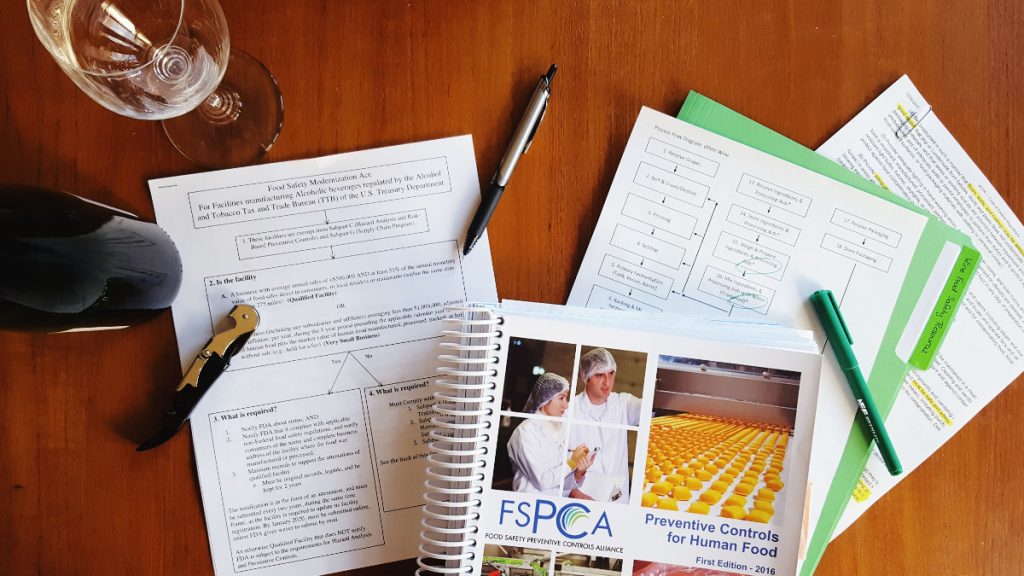*Note: This post was previously published in 2018, but was retracted after inquiries and discussions on some of the information. It is important to note that this post is not intended as legal advice. This article should help clarify some of the confusion related to federal FDA inspections associated with wineries. Wineries are encouraged to seek legal counsel to determine federal and state licensing procedures associated with their facility.
Many winery owners have inquired about what they have to actually do as a result of the Food Safety and Modernization Act (or FSMA, pronounced “Fis-mah”). The enactment of FSMA in 2011 changed the focus of FDA food regulation from reacting to food production risks or contamination problems, and is instead requiring food processors to prevent food contamination and safety risks.
It is currently the FDA’s goal to inspect all registered FDA facilities by the end of 2018.
In my discussions with winery owners and staff, there appears to be some confusion with FDA/FSMA and other inspections wineries are subjected to regularly. For example, many wineries experience health inspections led by their state (e.g., in Pennsylvania, this is the PDA) or local health departments. State and health department inspections are different than FDA inspections related to FSMA. However, many state agencies, like the PDA, are training their state inspectors to also conduct FDA inspections. Obviously, this can be very confusing for a winery.
Establish Federal Expectations for Your Winery
Most wineries, and other alcoholic beverage manufactures, will likely fall into an exemption status from Subparts C (Hazard Analysis and Risk-Based Preventative Control Plan) and G (Supply Chain Program) of the FSMA regulation. These two subparts include the most rigorous work associated with FSMA.
However, if the winery/alcoholic beverage facility is a FDA-registered facility these establishments like wineries are not exempt from Subparts:
- A: General Provisions
- B: Current Good Manufacturing Practices (cGMPs, including Employee Training)
- F: Requirements Applying to Records That Must Be Established and Maintained (Record Keeping).
This is outlined in detail in the FSMA regulation, 21 CFR 117, and can be read in the subsequent subparts (highlighted in the CFR as Subparts A through G). A previous “Understanding FSMA” posting from Cornell Cooperative Extension broke down the subparts for wineries to understand each section. Their post explains the purpose of each section within the regulation, and how it pertains to U.S. wineries.
A recent article published by Wine Business Monthly cited that wineries should evaluate if they need to register with the FDA to begin with. Obviously, if the winery is not registered with the FDA, then they will not be subjected to federal FDA inspections. Based on this article, if wineries are considered a Food Retail Establishment, then the winery may not be required to register with the FDA.
I have personally reached out to the FSMA hotline for clarification on this point. When I receive their feedback, I will make sure to update you on this blog post. With that in mind, the following paragraph is based on recommendations from previous articles related to FSMA and wineries.
How do you determine if your winery is a Food Retail Establishment at the federal level? Most articles written by lawyers suggest wineries with 51% or more of winery sales direct to consumer (DTC) may be considered a Food Retail Establishment at the federal level. However, please be aware that custom crush operations, in which wines are produced for other businesses, are not considered DTC. Wines that are distributed and/or sold at other retail stores like grocery stores are not considered DTC.
Again, if you are struggling to determine your federal status, it is best to consult with legal counsel to discuss your operation.
State Regulations for Your Winery are Different than FSMA
At the federal level, wineries will still need to register with the Alcohol and Tobacco Tax and Trade Bureau (TTB) regardless of their status with the FDA. This is in addition and outside the jurisdiction of the FDA.
Despite your status federally, your winery may have varying degrees of state and local licensing requirements as well. These requirements vary from state to state.
In Pennsylvania, for example, wineries must determine if they are a Food Establishment, a Food Retail Establishment, or a combination of both at the state level. Note that the requirements for these classifications may not be the same as the requirements for the FDA’s federal status. Unfortunately, the use of similar terminology, but with different meaning at both the federal and state level can get confusing.
Will Your Winery Undergo a FSMA Inspection?
Wineries that are not registered with the FDA will not be subjected to a FSMA inspection. However, it is important that you maintain adequate documentation to prove one’s status. Again, it is a good idea to seek legal counsel in determining licensing decisions.
For wineries that are FDA registered facilities, inspections are a bit of an unknown situation.
I have heard that PDA inspectors are currently in training or have been trained to execute FDA/FSMA inspections within Pennsylvania. This may or may not be true for other state agencies.
What is Expected during a FSMA Inspection?
Many wineries are in search of a checklist for what they need to provide for an inspection. However, the regulation is written such that the onus of determining what is important within your documentation is determined by and specific to your operation.
FDA inspections do not have to be announced. In most cases, the winery will not know an inspection of their operation was planned for that day. If an inspector does arrive at your door, it is a good idea to have one or two employees dedicated to working with inspectors. These employees should escort the inspector, understand the documentation that inspectors will want to see, be able to explain that a winery producing only alcoholic beverages is exempt from developing a preventative control plan if asked, and be willing to professionally work with an inspector. This will also be helpful to you in the event that if you are processing, you will not need to shut down all of your operations.
Also, it’s a good idea to assume that the FDA, or state agency inspectors on their behalf, does not understand the winemaking process. Remember, they are inspecting hundreds of different food and beverage manufacturing facilities, and they do not know the intricacies associated with each product. Therefore, it will be up to you to illustrate how wine is made at your facility.
What documentation does the FDA inspector want to see? In general, inspectors will probably look for these three things:
- documentation that describes how the winery is complying with regulations,
- documentation of what/how the winery processes their food product (i.e., wine), and
- records maintained and demonstrating the winery is actually performing those documented procedures.
I have found most wineries already have policies in place, including some records that will fit into the regulatory expectation. It is just a matter of getting those policies written on paper (or saved on a computer) in one space that can easily be accessed and evaluated by an inspector.
Nonetheless, addressing FSMA’s requirements does require some real time dedication, comprehensive knowledge of production sanitation procedures, awareness of production gaps in your facility, and comprehensive understanding of regulatory jargon. To say it simply, the hardest part of adhering to this regulation is getting started.
However, once a plan is in place and your documentation is organized, you can easily update the information annually.
These inspections are still new to the wine industry. Even in an event where you are prepared, it is possible an inspector may ask for additional documentation or detail on something you (or I) were unaware of. It’s okay and important to not panic. Ask for clarification if you do not understand what an inspector is looking for, and be willing to work with them as much as you can.

How can Denise Gardner Winemaking Help Your Winery Comply with FSMA?
While most collegiate institutions offer education and training in understanding FSMA and its components, very few offer services that help wineries develop specific written documentation that FDA inspectors will want to evaluate during an inspection.
Therefore, Denise Gardner Winemaking is here to help wineries identify problem areas and build documentation specific to their operation that will address the above regulation. I can assist wineries by:
- Creating process flow diagrams specific to your operation
While process flow diagrams are not required for wineries to retain, these diagrams illustrate the winemaking process and how your operation is creating a product. Having the illustration may be helpful in explaining your processing operation to an inspector.
- Developing and writing winery cGMPs
- Writing SOPs and SSOPs for winery operations
Retaining cGMPs, SOPs, and SSOPs specific to your operations are a part of the documentation that can be developed to address Subpart B of the FSMA regulation. While cGMPs are broadly discussed in the CFR, it’s important for your operation’s cGMPs to be specific to your winery’s practices.
- Identifying small improvements for ingredients and chemical storage
This discussion and review can help address some more consistent items that have come up in winery inspections.
- Providing training opportunities for winery employees
- Creating annual employee training procedures
- Documenting employee training for record keeping purposes
Creating a standard training program for your employees and documenting that training is a part of the documentation that can be developed to address Subparts B and F of the FSMA regulation. Training does not have to be extensive or expensive, but it should cover key items like hygiene, sanitation, and operation policies.
- Organizing documentation to be used in an inspection
I can help you get everything organized so that you walk away with a better understanding of how your operation works, and what you may need to review with an inspector should one arrive at your door.
All MAGNUM service packages include integration of FSMA compliance as part of their monthly services.
These parts take time to build, but we’ll work together systematically to improve your winery’s compliance.
Understanding how FSMA impacts your winery operation can be a challenge. If you are an FDA-registered winery and think this may be something you’d like to work on with some assistance, please do not hesitate to reach out to me directly at info@dgwinemaking.com.
